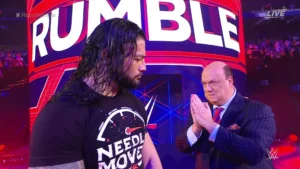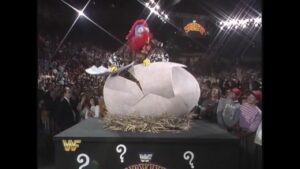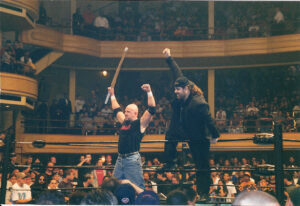On April 1, 1990, WWE held it’s sixth WrestleMania event, first started in 1985, and the first to be held outside of the United States. Hailing from the SkyDome in Toronto, Ontario, Canada, it would feature multiple notable matches, such as Dusty Rhodes & Sapphire vs. “Macho King” Randy Savage & Queen Sherri in Mixed Tag Team action, Rowdy Roddy Piper vs. Bad News Brown in a heated brawl, and Demolition defeating the Colossal Connection (Andre the Giant & Haku) for their third and final reign as WWF World Tag Team Champions. But without question, the biggest match of the night belonged to the main event, that saw WWF’s first Champion vs. Champion encounter, as WWF World Heavyweight Champion Hulk Hogan faced rising star and reigning WWF Intercontinental Champion Ultimate Warrior in a title vs. title match.

It was a storyline that would divide the WWF audience like never before. While the previous year’s WrestleMania V in Atlantic City, New Jersey had its polarizing element with Hogan facing WWF World Champion “Macho Man” Randy Savage in the finale of the Mega Powers exploding storyline that had run through most of 1988 into 1989, Savage was very cleary a heel by that point and had lost much of the audience support he’d had a year prior. But in 1990, both Hogan and Ultimate Warrior were the WWF’s top babyfaces and it would pit one generation versus another in a quest for WWF dominance.

By 1990, Hulk Hogan had been the Alpha Male in WWF for seven years – first winning the WWF World Heavyweight Championship from the Iron Sheik in 1983, he would dominate the WWF World title scene, holding it for the bulk of the rest of the decade. He only lost the WWF World title on one occasion – to Andre the Giant in 1988 following a 1,474-day run – and recaptured it in 1989 from Savage for another 364-day run heading into WrestleMania VI. But many of those 10-year-olds who were initially enamored with the superhero-like quality of the “Real American” Hulk Hogan in 1983, were now teenagers looking for someone with more edge than the squeaky clean imagery of the Hulkster.

That alternative hero arrived in the WWF in the fall of 1987 in the form of the long-haired painted face of the Ultimate Warrior. In his singles debut on WWF Superstars in October of 1987, the raging Warrior defeated Steve Lombardi in 2 minutes flat, and a new electricity was injected into the WWF Universe. Over the next three years, Ultimate Warrior went on a rampage that rock the WWF. In less than a year, he would become the man that ended Honky Tonk Man‘s still-record 454-day reign as WWF Intercontinental Champion at SummerSlam 1988, and do so in only 31 seconds. Warrior would go on to feud with “Ravishing” Rick Rude over the IC title, losing it to Rude at WrestleMania V, only to win it back from Rude at SummerSlam 1989 a few months later. He would hold the title for a combined 432-days and was in his second reign when he went into WrestleMania VI as the top contender for Hogan’s WWF World title.

By 1990, the counterculture of heavy metal was becoming the mainstream, as hair metal bands like Bon Jovi, Def Leppard, and Motley Crue were dominating the radio waves. With that, many of the little Hulksters, then 10-year olds when Hogan won in 1983, were rebellious 17-year olds looking for someone closer to their rock and roll heroes of the day. The long hair and aggression of Ultimate Warrior was just the right fit to become their new “people’s champion” and a new generation was hoping this new Superstar would finally upset Hogan’s 1980s stranglehold on the WWF’s top title. But make no mistake – Hogan was still clearly the #1 star of the company and still held a huge amount of public appeal in 1990. It was a battle that raged in the audience as much as it transpired inside the ring.
In the weeks that lead up to WrestleMania VI in Toronto, we saw a barrage of vignettes and promos from both men, including a rare (at the time) contract signing, as both men essentially became politicians to the WWF Universe. Both men plead their cases for why either the spirit of Hulkamania or the Way of the Warrior was the better path to conquer the mountain of life. As per usual, Warrior’s non-sensical ramblings were either inspired madness or complete and utter lunacy – but regardless, it captivated a sizable part of the audience.
On the day of the match, April 1, 1990, fans were divided on who they thought would win. Many fans of Ultimate Warrior were prepared to have their dreams shattered by the regular bulldozing from Hogan that WWF fans were accustomed too, while many Hogan fans were worried that perhaps, after seven long years, that Hogan may finally succumb to a younger, more aggressive hero. It was one of the first matches in Hogan’s WWF run in the 1980s where fans legitimately had no clue who would walk away as Champion. But by the end of the night, it was the Way of the Warrior that pushed the Ultimate Warrior passed Hulkamania and into the annuls of history, as the first man to simultaneously hold the WWF World and Intercontinental Championships (although he would vacate the IC title the following day).
https://www.youtube.com/watch?v=b_YlpEn3an0
Ultimate Warrior, while popular, would not duplicate Hulk Hogan’s drawing power as WWF Champion during his 293-day reign as World Champion. He would feud with “Million Dollar Man” Ted DiBiase, Haku, and his old IC rival, Rick Rude, during the remainder of 1990, but in early 1991, he lost the WWF World title to newly-turned traitor Sgt. Slaughter at Royal Rumble 1991. Ultimately, Slaughter’s victory – and short-lived 64-day reign as WWF World Champion – was just to return the World title to Hulk Hogan for his third time, but on that special night on April 1, 1990, in Toronto, Canada, the world finally saw a chink in the armor of the “Immortal” Hulk Hogan and from then on, his mystique would begin to dwindle until his ultimate departure from WWF in 1993. And while WWF’s rivals during the 1990s, Ted Turner’s World Championship Wrestling (WCW) would try and recapture the magic of that match with an angle between “Hollywood” Hulk Hogan and Warrior in 1998, the time was long gone and the moment lost.
Stay tuned to the Last Word on Pro Wrestling for more on this and other stories from around the world of wrestling, as they develop. You can always count on LWOPW to be on top of the major news in the wrestling world, as well as to provide you with analysis, previews, videos, interviews, and editorials on the wrestling world. WWE fan? You can check out an almost unlimited array of WWE and NXT content on the WWE Network.






